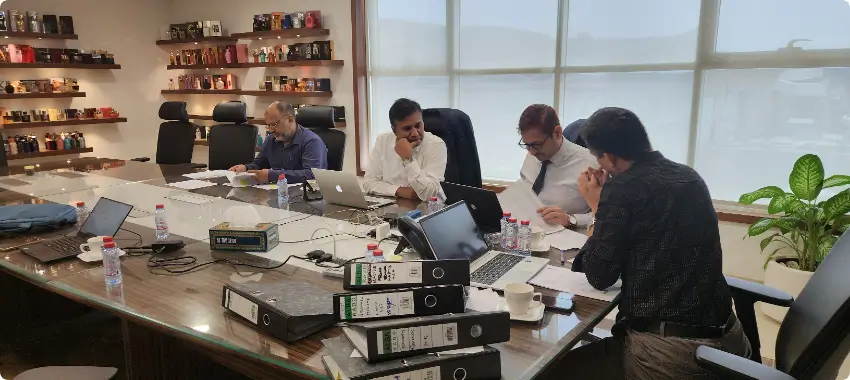
GMP Certification, an abbreviation for Good Manufacturing Practices, is a guideline standard ISO 22716:2007. This standard is a baseline pre-requisite for HACCP, ISO 22000, BRC FSSC 22000, and other food and hygiene standards. While applying food safety and hygiene standards, the GMP guideline has to be used as a baseline document. For the perfume and cosmetics industry, detergents, pharmaceuticals, etc., it is a primary guideline standard to be followed by the industry. As a good practice, the ISO 22716 GMP standard is recommended for all kinds of manufacturing industries in general.
Purpose Of Having GMP Certification
GMP certification aims to reduce potential dangers in production that cannot be eliminated by testing the end product. The primary purpose of GMP standard certification is to minimize the risks of failure as a proactive approach in the industry. The US Food and Drug Administration highly promotes it as a PRP for perfumes and cosmetics, detergents, and companies in the food supply chain.
GMP certification offers guidance for manufacturing, testing, and quality assurance to ensure that food or drug products are safe for human consumption.
ISO 22716:2007 GMP Certificate help us to;
- verifying equipment,
- maintaining records,
- validating processes,
- ensuring cleanliness,
- ensuring personnel qualifications.
- complaints handling
It is essential to have detailed SOPs and technical procedures to control the product's final quality. Additionally, a GMP standard should be applied in the organization to document evidence that defined SoPs are followed routinely.
Why ISO 22716:2007 GMP Certification Is Needed?
GMP-certified companies demonstrate to their stakeholders and interested parties that ISO 22716 GMP Certification is implemented and constantly followed in their organization. Their interested parties can trust their system to produce the highest-quality products and services.
Who Can Use GMP Certification
It applies to any organization – irrespective of their size or geographical location. Companies, including cosmetics, Perfumes, pharmaceuticals, and food manufacturing, use GMP certification as a recognized method to ensure customer satisfaction and control product and service quality in their respective industries.
Why Should My Organization Implement GMP Certification?
GMP certification enhances manufacturers' reputations as reliable organizations for producing the highest-quality products. It ensures consistent production and control of products according to quality standards. It minimizes risks that cannot be eliminated through testing the final product. It covers all aspects of production, including materials, premises, equipment, and staff hygiene.
GMP Certification – Benefits
- proves that the organization's management capabilities in product quality safety assurance are reliable
- helps to detect production and management problems timely, reduces cost
- reduces safety risks in product quality and safety
- enables employees to develop good production/operations habits
- enhance the international credibility and public image
- GMP certificate provides a better understanding and compliance with the relevant laws and regulations
It Increases customers' long-term confidence in the enterprise.
GMP Certification Requirements?
- Clear explanation of manufacturing processes.
- Follow methods and protocols as per the GMP standard.
- Operators should undergo training sessions according to GMP guidelines.
- Ensure proper maintenance and documentation of production.
- Identify risks and errors.
- Implement corrective actions.
- Maintain adequate sanitation and hygiene.
- Establish a well-designed GMP complaints forum.
Conduct regular inspections and GMP certification audits.
GMP Certification Process?
- GMP certification requires choosing the right program
- Find areas that need to be in compliance with the current GMP guidelines.
- Quality GMP consultants can help through quality consulting services.
- Develop and implement GMP policies and procedures as per GMP standards.
- Define a comprehensive management system, as per best practices defined by good manufacturing practices, that encompasses all aspects of your production system and can efficiently gather and present information.
- Integrate management systems wherever possible to meet customer demands and maintain consistent performance.
- Enhance your team's performance through internal audits to handle identified issues.
Role Of Consultant In GMP Certification
GMP consultants play a crucial role in helping companies achieve a GMP certificate. Quality GMP consultants help build a GMP system in an organization based on GMP guidelines. They offer support during the certification process so the organization can be GMP-certified.
Selection Of Certification Body.
An Independent, third-party accredited certification body from a country's approved national accreditation body will conduct an independent and impartial audit.
Qdot's top professional GMP consultants will guide your team through the entire certification process, from the initial steps to the final stage until the certification is done.
Qdot offers GMP consultancy services in Dubai, Sharjah, UAE, Qatar, Saudi Arabia (KSA), Oman, Bahrain, Kuwait and Pakistan.
FAQ's
ISO 22716 is crucial for cosmetics manufacturers as it ensures product safety and quality, fosters consumer trust, and meets legal requirements. Compliance with this standard helps facilities avoid costly recalls and legal issues by maintaining high manufacturing practices.
GMP consultants provide expert guidance on implementing ISO 22716 standards. They help identify gaps in current practices, prepare necessary documentation, train staff, and ensure that all certification requirements are met.
The time required to obtain GMP certification under ISO 22716 varies depending on the current state of your operations. With the support of GMP consultants, the process can be expedited and typically takes several months.
Yes, ISO 22716 GMP certification is accessible to small businesses. The standard is designed to be flexible and adaptable, allowing manufacturers of all sizes to achieve compliance.
An ISO 22716 GMP certificate generally needs to be renewed every three years. Regular audits and assessments are conducted to ensure that ongoing compliance with GMP standards is maintained.
